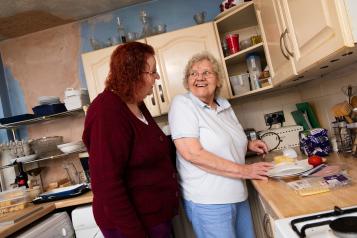“We just want what’s best for our daughter."

Mr. and Mrs. Junah migrated from Nigeria and lived with their daughter Betty until they were unable to cope any longer. Betty moved away from home because her parents couldn’t give her all the support she needed.
"She behaves like she's 12 and has anger and behavioural issues. We wanted the best for her, but it became very hard to handle her behaviour." Betty, aged 23, now lives in supported accommodation. Betty has learning disabilities, autism spectrum disorder (ASD), epilepsy, and mental health issues.
Betty’s vulnerability means her parents worry about how she is being looked after and ‘adapting to different supported living homes was tough for her,’ said her father.
“We want to know if that place is good for her, if she gets the support she needs. We request for updates, health plans, and reviews but they share nothing. There has been a lot of communication gaps right from the beginning of her staying in the project between us, the management, and staffs of the supported living, these had prompted a lot of meetings between ourselves, the staff of the supported living and the psychology team but they make changes without asking us or sharing any documentation. They never provide us with any documentation. To us we are just rounding in circles as we feel they do not carry out instructions as we all agreed at the end of each meeting…”, said the father.
Families can be a vital part of life for someone who needs care and support, and working well with them is an important part of person-centred care. When services communicate and listen to families and explore solutions together, outcomes for individuals can be improved.
Betty’s parents want more transparency over how decisions about Betty’s care are made but say they’ve been labelled as difficult for raising concerns.
"We want to move our daughter to a different care home because we don’t trust the support she gets. They let her stay out until 3 in the morning, knowing how vulnerable she is” explained Betty's father. “When we complain, they label us aggressive, but we just want what’s best for our daughter."
Provider Response: Response from Royal Borough of Greenwich
How we assure the quality of Supported Living settings and act on any reported concerns?
Health and Adults Services has a Quality Assurance Team which undertakes regular visits to all care homes and supported living services in the borough where we have placed residents. These quality assurance visits look at 15 aspects of service delivery including, the general state of the building, the quality of support plans and other documents, staff training, management arrangements and safeguarding. It specifically contains a number of residents focussed questions seeking direct feedback on their experiences of living at the service so that we can garner how they are supported on their chosen goals, choices and life experiences. Questions have been developed with an eye to positive cultures, person centred care and promotion of a good quality of life and well-being. The Quality Assurance Team does write to the families of people living in services to ask for their views of the homes however this is not an automatic exercise, but one based on the level/ability of the resident to have meaningful engagement and interaction that can take place during our visit. If we have interacted with the resident to a satisfactory level and feel that we have captured their voice at the service, then we would not question their autonomy but respect and record their views into our finalised provider report, therefore would not feel it necessary to contact next of kin or family on this occasion. Our quality assurance process includes a section on care plan audits which does query if support plans clearly identify goals & outcomes with the necessary progress being captured.
After each visit the service will receive a report setting out our findings and required or recommended actions to improve service quality. Where the visit has identified that further action is required a follow up visit will be arranged to check on the provider’s progress implementing those actions. If we had immediate concerns these would also be flagged with the Community Learning Disability Team with the request for urgent care review.
How operationally we support to ensure people are in places which support them to achieve their outcomes and what happens if the adult/their circle of support are unhappy with the setting they are placed in (where we commission their care and support)?
Our aim is to ensure our practice is person centred and takes in to account the wishes of residents and their family or circle of support where this is a appropriate. We acknowledge that sharing information with families at the appropriate time, along with communicating with families when there are restrictions to what we communicate and can act on is an area of improvement. Our community learning disability operational teams are committed to focussing on this in the coming year.

